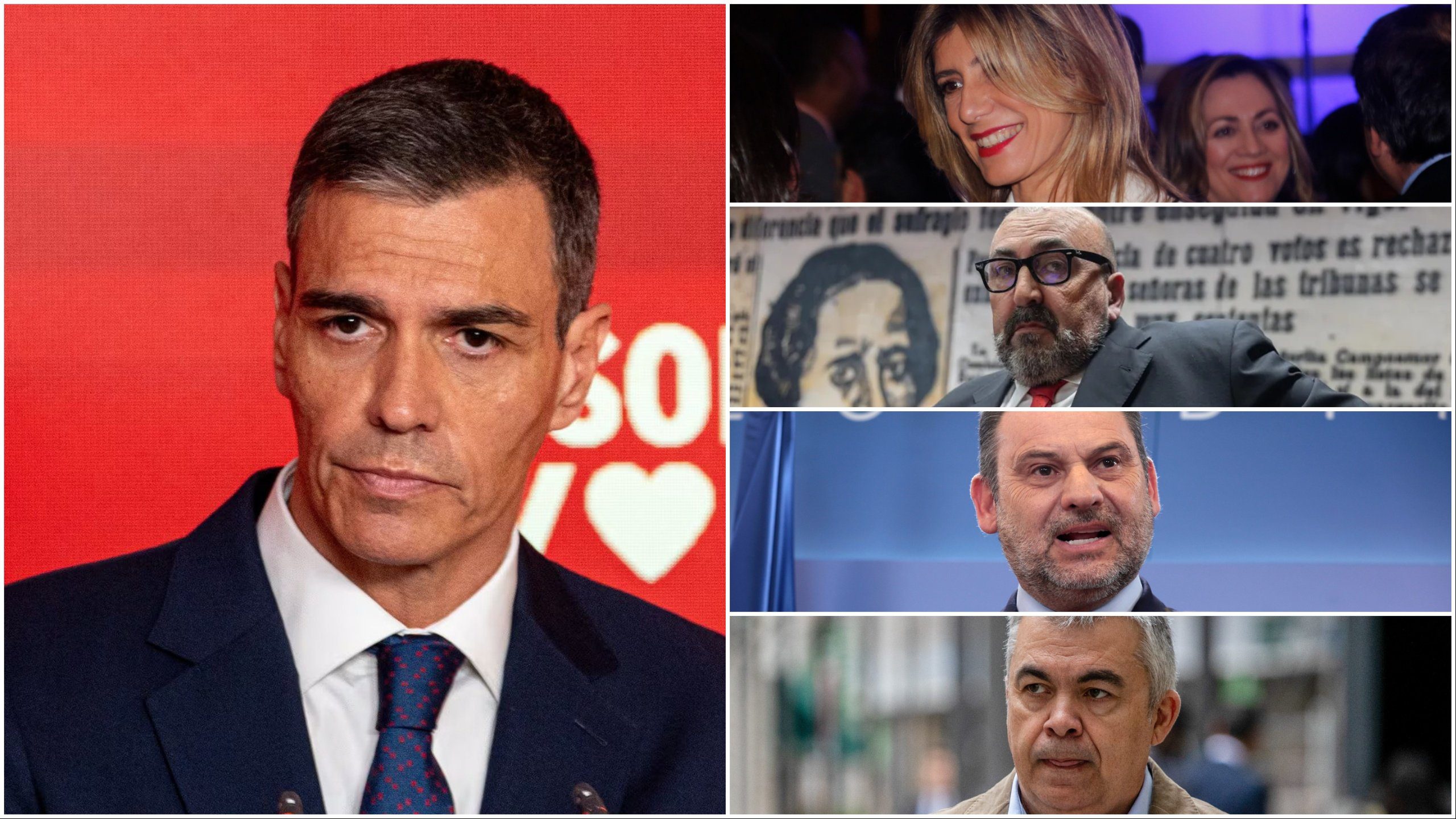
SPANISH Prime Minister Pedro Sanchez has found himself trapped in the eternal cycle of Spanish politics.
Rising to power in 2018 on a promise to clean up Spanish politics, the socialist leader is now facing a web of corruption allegations that have ensnared his closest allies and threaten to bring him down.
While some of the charges could be brushed off as smears by his right-wing adversaries, others appear to go to the heart of his ruling Socialist Party (PSOE).
The scandal centres on ‘Operation Delorme’, a sweeping investigation by Spain’s Guardia Civil that has uncovered an alleged corruption network centred around Sanchez’s friends, family and allies.
The allegations include inflated public contracts, illegal commissions, and money laundering.
It’s a grim irony for Sanchez, who had positioned himself as new broom after he dethroned conservative PM Mariano Rajoy in a vote of no confidence.
READ MORE: Pedro Sanchez challenges opposition parties to bring down Spain’s government

How did it start?
The investigation initially focused on dodgy mask contracts awarded during the COVID-19 pandemic in 2020, but has since expanded to encompass broader allegations of public works fraud.
At the heart of the scheme stands Koldo García, a political advisor linked to the Socialist Party (PSOE), who investigators believe orchestrated the corrupt network.
García faces charges including criminal organisation, influence peddling, bribery, and money laundering. The investigation suggests the network paid inflated prices for masks, some of which were of poor quality, whilst channelling part of the funds into illegal commissions through shell companies.
READ MORE: Spain’s PM Pedro Sanchez apologises for latest corruption scandal but won’t call early elections

Who are the key players?
The scandal has claimed several high-profile casualties.
Santos Cerdan, Sanchez’s number three who held the powerful position of PSOE’s Secretary of Organisation, resigned last week after Guardia Civil recordings allegedly implicated him in discussions about bribes.
Cerdan had been one of Sanchez’s most trusted allies and had supported the Prime Minister’s rise to party leadership in 2014.
Jose Luis Abalos, the former Transport Minister who held Cerdan’s party role until 2021, is also under investigation by the Supreme Court for influence peddling, criminal organisation, bribery, and embezzlement.
Abalos was previously embroiled in controversy over a 2020 airport meeting with Venezuelan Vice President Delcy Rodríguez, who was banned from entering EU territory.
The current investigation has revealed connections between Rodríguez and members of the alleged corruption network.
READ MORE: Major ally of Spain’s PM Pedro Sanchez resigns as corruption probe uncovers €620k of bribes

How far back does it go?
The Guardia Civil recordings have exposed additional improprieties, including apparent vote rigging in the 2014 PSOE leadership contest that brought Sánchez to power.
Whilst the alleged irregularities would not have affected the outcome, given Sanchez’s commanding victory margin of over 16,000 votes, the revelations cast further shadows over his administration.
Sanchez has apologised to Spanish voters for trusting Cerdan but firmly rejected calls from the conservative opposition to resign or call early elections.
The Prime Minister maintains he was unaware of the corruption and insists it involves only a few individuals rather than systemic party wrongdoing.
He has ordered an audit of PSOE finances to address concerns about potential illegal party funding, though current evidence does not suggest this occurred.
READ MORE: Brother of Spain’s PM Pedro Sanchez to stand trial for ‘misuse of public funds’

Is Sanchez’s family involved too?
The crisis extends beyond the mask contract affair to encompass Sánchez’s inner circle.
His wife, Begoña Gomez, faces investigation for alleged corruption and influence peddling, based on complaints filed by far-right associations and the Vox party that many consider manufactured.
Despite prosecutors requesting the case be archived and the Guardia Civil finding no evidence of wrongdoing, a court has ordered the investigation to proceed.
Meanwhile, the Prime Minister’s brother, David Sanchez, will stand trial for alleged influence peddling and administrative misconduct related to how he obtained his regional government position.
Additionally, Attorney General Alvaro García Ortiz, another Sanchez ally, faces trial for allegedly leaking confidential information in a case involving the partner of Madrid regional president Isabel Díaz Ayuso, a prominent conservative politician.

Can Sanchez survive?
The multiple investigations have placed Sanchez’s coalition government under severe strain.
His administration relies on support from various minority partners, including left-wing and Catalan and Basque nationalist parties, to maintain its parliamentary majority.
Both Deputy Prime Minister Yolanda Díaz, who leads the left-wing Sumar coalition, and Catalan nationalist parties have indicated their continued support depends on the government’s response to the corruption allegations.
Conservative opposition leader Alberto Nuñez Feijoo has demanded Sánchez’s resignation and early elections, though he has ruled out attempting a no-confidence vote, believing the numbers would not support success and might paradoxically strengthen Sánchez’s position.
Feijóo has appealed to government coalition partners to abandon what his Popular Party (PP) characterises as ‘a mafia’.
However, the alternative government would likely comprise Feijoo’s conservatives allied with the far-right Vox party, a prospect that neither left-wing nor nationalist parties would welcome.
This political arithmetic may ultimately work in Sanchez’s favour, as his coalition partners weigh the corruption allegations against the prospect of a right-wing government.
The scandal represents a bitter irony for Sanchez, who came to power in 2018 through a no-confidence vote against conservative predecessor Mariano Rajoy, whose government had been weakened by corruption scandals that led to criminal convictions for several Popular Party members.
With general elections not scheduled until 2027, the Prime Minister has time to weather this crisis, but only if he can maintain the delicate coalition that keeps him in power.






